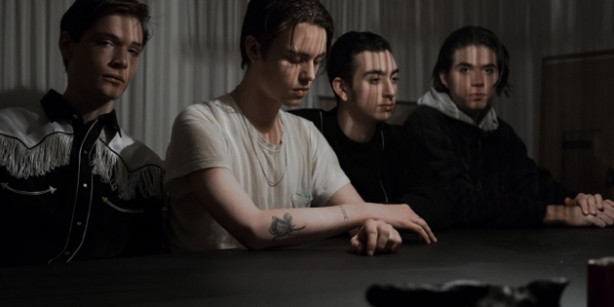 Music
Music
Danish punks Iceage talk 'You're Nothing,' explain why they're not fascists
by Mark Teo
May 22, 2013
The term “mysterious-guy hardcore” isn’t typically associated with Iceage’s music — mostly because hardcore is only a fraction of their sonic equation — but, when it comes to the band’s rapid ascension, the description feels apt. A synopsis: In 2011, a troupe of devastatingly handsome, Fred Perry-toting teenagers emerge from Copenhagen, Denmark’s D.I.Y. scene to little fanfare. They release New Brigade, unveiling an arresting brand of tundra-cold, Brit-informed post-punk. They earn near-unanimous praise for their precise songwriting and capital-A artful experimentation; more than one publication crowns them the shape of punk to come. They sign to Matador. They sell locks of their hair and custom knives as merch. Then, the shitstorm: Thanks to Iceage’s runic iconography, their Burzum tattoos—who, despite the Norwegian band’s racist leanings, are loved by metal fans of all stripes—and dubious sketches from the band’s Dogmeat zine, they are painted as fascists. The only problem? They’re not fascists. And they’ve denied it. Over. And over. And…
“It’s weird that people don’t understand it,” says drummer Dan Kjær Nielsen. “It’s as if people want to classify us as something we’re not. People go hunting for something that’s not there, and they’re discovering only what they want to see.”
I suggest that Iceage’s scandal is similar to that of Merchandise-associated hardcore act Church Whip, who felt the internet’s wrath when they unknowingly—if stupidly—called their tour “Raping the East.” Nielsen sees comparables. “People are trying to discover [controversy] that doesn’t exist,” he says. “That tour name—I doubt that Church Whip is [encouraging] raping anyone. They play a type of music that, I’m sure they meant to say, ‘rapes ears.’”
Still maybe problematic, but here’s what Nielsen’s getting at: People are confusing Iceage’s divisive aesthetic—which, the band correctly points out, actually does not include any right-wing symbols or ideology—with their infectiously challenging music. Their loss, we say, because amidst Iceage’s controversy, their sophomore LP, You’re Nothing, arrived. And it, unlike their punk-goes-indie brethren (cough, The Men), their sophomore effort flat-out devastates: Ditching the post-punk for flat-out punk rock, You’re Nothing’s sonic signifiers veer from the Replacements to Rev Summer-esque post-hardcore to full-on black metal. The vicious result, says Nielsen, came from recording the album in a vacuum: They band holed up in a deserted farm on Møn, a Danish island, where they tackled You’re Nothing free of any distractions.
“We didn’t even think of it as a follow-up,” he says. “We didn’t think of New Brigade at all while we were making it. I mean, I’ve progressed a lot in the way I play [the drums], and with the willingness to try new things. But we didn’t know how the album would come out—we never said, ‘We have to make songs like this.’”
That free-form approach to songwriting is evident on You’re Nothing’s first spin: There’s the sing-shouted lyrics, which, according to singer Elias Bender Rønnenfelt, drew inspiration from literary minds as diverse as Joseph Conrad, Peter Shaffer, and Octave Mirbeau. There’s a marvelous bipolar nature to their songs; You’re Nothing is evenly split between snarling urgency (“Esctasy”) and death-march nihilism (as in “Wounded Hearts.”) And somehow, on “Morals”—perhaps the LP’s most talked-about track— Iceage even attempt a piano-driven hardcore track—and pull it off in stunning fashion, balancing elegant with batshit insane. It’s not hard to see why Iceage are viewed as punk rock’s savants: While the genre is clearly their launching pad, unlike their peers, are attempting to create music that doesn’t pander to eras, subgenres, or any well-worn aesthetic blueprint. It’s dangerous, sure, but it’s endlessly fascinating.
“We don’t play traditional punk or hardcore—we don’t try to recreate a specific sound or era, like other bands,” says Nielsen. “We just play rock music, and people hear what they want to hear in it. We cover a broad spectrum of feelings in our songs, but it’s not perfect — you can see the seams. It’s important for us to create new atmospheres with our music.”
We press for specifics, but Nielsen—who, like other members of Iceage, is a notoriously reserved interview—declines. Maybe, to refer back to the term, it’s part of the band’s mysterious-guy mystique. “Maybe you could say that,” says Nielsen. “We just want to keep it as open and interpretive as we can.”

This article originally appeared in the May 2013 Issue of AUX Magazine.
Download and subscribe for free in the app store.
Tags: Music, Interviews, Church Whip, Iceage, Merchandise





